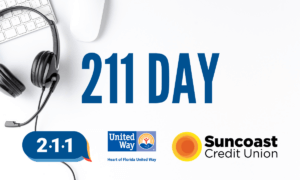Many Central Floridians struggle to afford basic necessities like housing, transportation, and healthcare, a burden that can be worsened by tax season confusion. Heart of Florida United Way is committed to empowering individuals and families with resources for financial stability and upward mobility.
To help navigate this complex time, here are four tax myths to debunk:
- The Early Bird Doesn’t Get the Refund
While filing early might seem advantageous for those hoping for a quick refund, it can be detrimental. The IRS doesn’t begin accepting returns until late January, and by law, returns claiming the Earned Income Tax Credit (EITC) or Child Tax Credit (CTC) cannot begin processing refunds until mid-February. Any money received from filing early for holiday spending is not a refund but rather a loan.
- It’s a Tax Return, Not a Lottery Ticket
Advertising promising large sums like “$8,000 per kid on a return” often surfaces during tax season. However, these claims should be approached with skepticism. While taxpayers with children can benefit from credits like the EITC and the Child Tax Credit, there are limits to how much can be received. The EITC offers a maximum of $7,830 for those with three or more children. The CTC provides $2,000 per child under 17, but only $1,700 of that is refundable.
- Side Hustle Responsibly
Many individuals pursue side hustles for extra income. Services like Uber and DoorDash typically issue 1099s to their workers. A 1099 designates the recipient as an independent contractor, responsible for paying both the employer and employee portions of taxes (income, Social Security, Medicare, etc.) from their earnings. It’s essential to meticulously track mileage and other related expenses, such as work supplies, licenses, and app fees, for potential write-offs. If a side hustle evolves into full-time employment, making estimated tax payments throughout the year can prevent a large tax bill during tax season.
- Inability to Pay Isn’t a Crime
Facing a tax bill that exceeds one’s ability to pay can be stressful. However, the IRS does not penalize taxpayers for being unable to pay upfront. They will, however, impose fees and interest for failing to file or refusing to pay. Exploring options like payment plans or consulting with an IRS Tax Advocate can help manage debt and prevent financial hardship. Consulting with a tax preparer to understand the reasons behind a high tax bill can also help taxpayers take steps to minimize their tax liability in future tax seasons.
Need tax preparation help or know someone who does? Our Volunteer Income Tax Assistance (VITA) program is here to help!
VITA is a free tax preparation service run by IRS-verified volunteers available to families in Orange, Osceola, and Seminole counties. VITA volunteers are able to help electronically file basic income tax returns at convenient times and locations throughout tax season.
The VITA program works with you to make sure that you are getting the most out of your tax return.
LEARN MORE ABOUT VITA SERVICES









